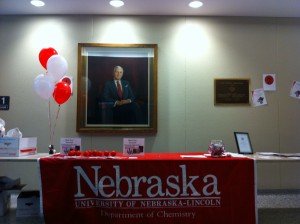I firmly believe the world needs more science librarians, and that this need is accelerated by the increasingly interdisciplinary, collaborative, and technological nature of science. Sadly, as in many industries, funding is hard to come by, but even so there are openings here and there for people who are fortunate enough to live locally or to be able to move.
Defining what science librarians do, and the ideal background for a science librarian is very difficult because as the archivists like to say “it depends” on the individual, the science discipline, and the work they will be asked to do.
* Disclaimer: This post reflects my own thoughts and feelings, not necessarily those of my employer or any group with which I am affiliated.? As a new science librarian much of this post is based on my observations of successful science librarians whom I respect.
10 Traits of Science Librarians
- Enthusiasm for science! Depending on your job you maybe highly specialized in one area, or you may cover broad subject areas, or you may need to be familiar with 8+ related fields. If you don’t like science I think it would be very hard to be a science librarian at most places.
- Knowledge of scientific terminology. This knowledge can be gained formally or informally but the fact is the language of science is very different from that of the humanities and the arts, although it does bear some resemblance to that of the social sciences.? Having a common vocabulary is very important when communicating with scientists since the same word can mean vastly different things in different disciplines.? It’s important to be able to say what you mean and that means knowing the vocabulary of science.
- Tech Love aka Embracing their inner geek! Instruments are increasingly high tech, most if not all data analysis is done with computers, almost all the major journals are available as e-journals, open access journals are completely electronic, and please don’t get me started on the problem of file formats and preservation!? Throw in NASA iPhone and Android applications and you can see there’s no getting away from technology when you’re involved in science.
- Collection development skills. No matter how good your approval plan is it is not perfect, nor are all books that should be purchased available from any one company. Science librarians also recommend electronic resources, investigate how many “seats” are needed to serve faculty and students, and try and find ways for faculty to successfully lobby for more funding of electronic resources. We communicate to vendors what faculty and students do and do not like about their e- resource services.
- Adaptability. The responsibilities of science librarians are constantly evolving books are only a small part of what we do. You may also teach, work the reference desk, serve on library, university, and association committees, conduct research, submit grant proposals, publish, present, help students & faculty with research questions and technology, work outreach events, attend staff and department meetings, and interact with everyone at the university from community users to the chancellor or president of your school. (These are some but not all of the things I do, and no I don’t do all of these things every week, there is not that much time in the week.)
- Curiosity! To be successful you should be curiosity personified. In order to understand my subject areas I’m constantly reading about advances and controversies in their disciplines and related disciplines. If you look at things from the side almost every discipline overlaps and you don’t want to miss the “big picture”.
- Know how their library works. Subject specialists/liaisons wear many hats including what some of my faculty like to term “ambassador for the library”. We present the good and try and help ease the sting of the bad (read budget cuts). We advocate for the library with the faculty, and take faculty praise and concerns to the library. We must be diplomatic, sympathetic, and congenial. We must also be honest, dependable, and engaged. In order to be these things we have to understand enough about what everyone else does, and be willing to find out more about how things work to field faculty questions and provide in depth answers about how things work and what we can and cannot change. A good set of examples is that we can create course and department specific guides to resources, but we cannot add to the current years subscriptions of journals without dropping journals of equal value, the budget for this year is set.
- Constantly engaged with colleagues both local and dispersed. I’m very new, but one thing I’ve noticed about successful science librarians is they don’t try and do it all alone, they collaborate, they ask questions, they learn from their colleagues both near and far. Being a librarian isn’t about knowing everything and that is even truer for science librarians. Being a science librarian is knowing enough to find out more, ask people who know how to find what you’re looking for or refer you to someone who knows how to find it. Maybe there is some super genius librarian succeeding in a vacuum that the rest of us don’t know about, but the rest of us mere humans succeed through learning from our colleagues and patrons, and being willing to pass on what we have learned to others.
- Learn their organizations political structure. If you don’t do this you will be at a severe disadvantage when you want to get things done. You are by virtue of your position a leader of sorts and you really don’t want to do everything the hard way. Sometimes it isn’t what you ask, but who or how you ask.
- They take to heart “Protect your dean!” (This corollary to number 9 was coined by one of my co-workers.) Your dean is in charge of the library, make sure they know about all ideas you’re actively exploring so that if someone hears about your activities and mentions them to you dean he or she isn’t left going ? (You should always be keeping your boss in the loop too!) A good rule of thumb is to give your dean an elevator pitch or brief e-mail about anything new you are looking into. E-mail can be especially useful if you are shy or your dean doesn’t have an open door policy, keep in mind an e-mail doesn’t have to be terribly in depth it can be 2-3 sentences and labeled as an FYI. If your dean wants to know more about your idea or has an objection I am sure they will let you know. They may even have some good advice for you, but the point is you don’t leave them hanging.
* Many of these traits are necessary to other types of librarians, but I would argue that doesn’t make them less essential to science librarianship.
What do you think are the traits of successful Science Librarians?


